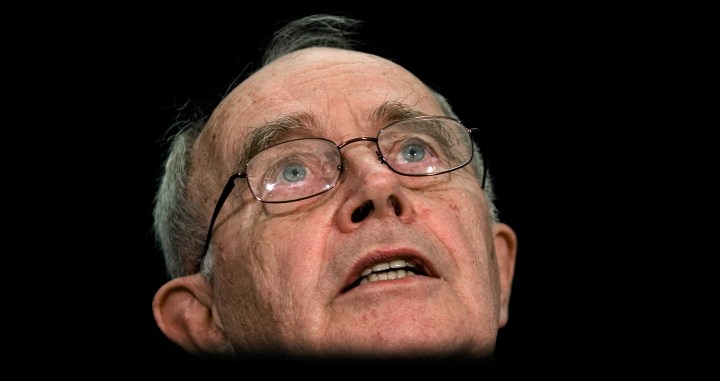MAVERICK CITIZEN
The judiciary in democratic South Africa forced to play a sole honourable role, says Judge Johann Kriegler

Retired Constitutional Court Judge Johann Kriegler sat down for a candid interview with Cecelia Kok of the Friedrich Naumann Foundation for Freedom to discuss the state of the judiciary in a democratic South Africa.
In the video, Judge Johann Kriegler talks of how the judiciary has had to step in when the executive had gone rogue even prior to Jacob Zuma becoming president, with the legislature also not performing their oversight role over the executive. This left the judiciary to play what he said was “a sole honourable role”. While he says it was not perfect, it was the pillar that tried to do what the Constitution demanded of it.
He assesses the composition of the judiciary as that which has gone through a radical transformation, particularly in terms of race and sex — something he says has not come without cost. Kriegler talks about how the political context of the time created the need for a policy of appointment on “promise” and not necessarily on experience “which was fully justifiable at the time”, even though technically and administratively risky.
He explains the cost as being that of judgments that may not have been as good as they should be because of the inexperience of appointed judges. He talks about how the Judicial Service Commission (JSC) and magistrate’s commission “have faltered in a number of respects” and how in other respects the decisions and forecasts that the judiciary had made had been “shiningly correct”.
“Judge John Hlophe, for example, if he had been given some years at the Bar, if he had been given some years as a junior judge … if he had been given 10/12 years to get to know the ropes … he would have been an outstanding judge. He was given power too soon, he was given authority too soon,” which Kriegler says is why the Western Cape High Court is now “a very sad place for everyone who loves law and justice”.
On considering what it means to consider judicial appointments, Kriegler is clear that the Constitution says “you must have competence and you must have representativity, it does not say you must have transformation”.
“The lack of sufficient discourse in the law at the moment is upsetting, the level of discourse in law journals is not particularly good, the level of discourse in judgments is not particularly good, we are not progressing,” Kriegler emphatically states in the video.
He also explains the controversy about advocate Geoff Budlender not being appointed as judge, saying that he cannot understand why he has not been appointed, citing his political background and years of experience in the legal fraternity.
Kriegler also explains that members of the JSC take an oath of office which is to the Constitution and not to a political party. If they are not morally or intellectually fit they do not belong at JSC, as he says it’s a job of great responsibility and importance.
“There is a need for self-vigilance and collegial vigilance,” says Kriegler, adding that this is required all the more now — with the restrictions and limitations stemming from the impact of Covid-19 — in order to guard against the temptation of judicial officers taking shortcuts.
According to Kriegler, it is the public nature of court proceedings that helps keep judicial officers on the straight and narrow.
Turning his attention to the Chief Justice of South Africa, Kriegler says it’s an office of great moral authority and legal authority, saying that the current Chief Justice Mogoeng Mogoeng had done a good job of running the Constitutional Court during his tenure.
During his time as a judge, Kriegler says that he had tried to maintain a sense that the court does not belong to him but to the people and remembering that the power of a judge is through the Constitution and not personal. DM/MC
The full video discussion is available here.




















 Become an Insider
Become an Insider
To say that the judiciary played “a sole honourable role” (with some exceptions) overstates the case. The opposition parties and printed media (with some exceptions) also played an honourable role.
Thank you Judge Kriegler for your service.
Your point about the effects of BEE legislation on individuals who have been promoted too quickly to fill quotas is completely valid.
Both the individual and society are done a great disservice.